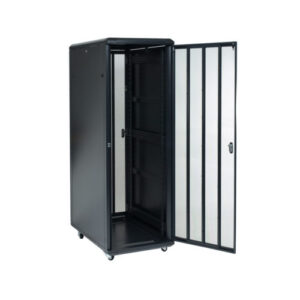When it comes to web optimization, a dedicated server delivers speed, stronger security measures, and responsiveness. With ample processing power, memory, and bandwidth at your disposal, your website will be able to handle high levels of traffic.
What is a Dedicated Server?
A dedicated server is a high-performance computer system that is primarily leased to a single customer or organization. Compared to shared hosting, where multiple websites use the same server, you have full control of the physical server’s resources to run high-volume websites, applications and services.
For applications that require high availability or compute-intensive workloads, an isolated physical server environment is beneficial. With dedicated servers, organizations have the ability to configure hardware specifications, operating systems, and software according to their specific needs.
What are the Advantages of a Dedicated Server?
The key benefits of using a dedicated server are enhanced performance, increased security, scalability, configuration control, and reliability.
- Enhanced Performance – With dedicated server resources, your website or application operates at optimal speeds, ensuring fast loading times and smooth performance even during peak traffic periods.
- Increased Security – Dedicated servers are not shared with other users, so the risk of security breaches from other websites is minimized. This gives you complete control over the software and hardware, so you can implement any security strategies your organization requires.
- Scalability – For organizations that are experiencing or expecting rapid growth, dedicated servers provide scalability to accommodate your growing needs. As your website or application expands, you will be able to upgrade the CPU, RAM, and storage capacity.
- Configuration Control – Unlike other types of hosting, you will have complete control over server management, which includes server configurations, installations, updates, and maintenance tasks. This allows you to efficiently optimize performance and troubleshoot issues.
- Reliability – All of your resources are dedicated to your server, so the performance and uptime are consistent. This is especially important for critical applications and websites that cannot afford to be out of service.
Dedicated Servers and Their Use Cases
If you are looking for a hosting solution with high performance, security, customization, and control, then you should consider using a dedicated server for your organization. Here are some examples of different industries and scenarios that rely on dedicated servers:
- Ecommerce: Ecommerce businesses are able to improve their performance and security with dedicated servers. For businesses that sell products online, they will be able to ensure that their website is fast and secure in order to provide efficient customer experience.
- Media Streaming: For media businesses that need to deliver high-quality content to their users, dedicated servers can help media organizations to host and deliver large amounts of media files, such as videos and images.
- Gaming Servers: Dedicated gaming servers are popular for hosting multiplayer online games. They offer low latency, high performance, and the ability to handle many simultaneous players. This helps gaming businesses to provide a lag-free gaming experience for their players.
- High Performance Computing (HPC): High performance computing (HPC) workloads require access and control of significant compute resources. It is efficient to fully control and configure the physical server running your HPC applications.
- Data Storage and Backup: Dedicated servers offer centralized storage repositories for large volumes of data, backups, or disaster recovery solutions, ensuring data integrity, security, and accessibility.
How Does Dedicated Hosting Work?
Dedicated hosting is where a single server is hosted on behalf of a single client or website. The client has full control over the computer, so they can optimize it for their specific needs, such as performance and security. This type of website hosting provides resource allocation, privacy, and control. With dedicated hosting, the dedicated server is isolated from one another. This means that users have full access to configure their server however they want without impacting another user, or being influenced by other users.
Additionally, dedicated hosting allows you to lease a dedicated server directly from your hosting provider’s data center. This means leasing the physical server and all the resources that come with it. Your organization will be able to access the server’s CPU, memory, storage and bandwidth. In the event that the server hardware fails or has technical issues, most dedicated hosting provides a certain amount of uptime and support.
Generally, you’ll have root access or administrative access to your server. This allows you to install software, manage user accounts, adjust server settings, and perform any administrative tasks. Depending on your requirements, you can also select the operating system, software applications, and specific configurations.

Key Considerations For Dedicated Hosting
Selecting the right dedicated web hosting solution provider is challenging because of the many options to choose from. To help you narrow down your choices, here are 6 key considerations when looking into dedicated hosting:
- Hosting Needs and Performance Requirements – You need to determine your website type, the expected amount of website traffic, and resources that would be needed to support your website.
- Assess Server Management – Do you want to manage the server yourself or have a hosting provider manage it? It is important to find a hosting provider that meets your standards for management.
- Server Security – To protect your website and data, hosting providers that provide strong security will be beneficial. This includes firewalls, anti-malware detection and intrusion prevention.
- Server Uptime – When searching for a hosting provider regarding server uptime, you should look for one that can provide high server performance with little to no downtime or service issues.
- Customer Support – You need to ensure that the hosting service provides fast and reliable support to help resolve server issues or technical issues.
- Pricing and Budget – Thoroughly check pricing plans from the hosting providers to find the right plan for your budget and hosting requirements.
RackSolutions Server Racks and Cabinets
Dedicated servers are typically housed in data centers that provide the infrastructure and environment necessary for their operation. For hosting providers that want to enhance their data center locations, we provide a variety of server racks, cabinets, and rack accessories. In addition, our server racks are compatible with all leading OEM servers and equipment, such as Dell, HP and IBM/Lenovo.

If you have any questions about our products, feel free to contact us for more information. With our high-quality, in house manufacturing, you can be confident that you are buying the best equipment possible!
FAQs: Dedicated Servers
How do you set up a dedicated server?
For starters, setting up a dedicated server may require a wide range of hardware, software, and networking components. These components are entirely based on your business needs and requirements. Commons requirements to consider include: a high-performance hardware configuration, operating system that is compatible with the server hardware and the applications or services, reliable internet connection for fast data transfer rates and low latency, control panel for managing the server, advanced security measures, and data backup solutions.
You will need technical expertise in server administration, networking, and security when setting up a dedicated server. However, you can choose to have a dedicated server where the hosting provider manages the server.
How many websites can I host on a dedicated server?
As long as you have enough resources available, you can host multiple websites on a dedicated server. However, each website that you have will use up some of your server’s resources. This means that you should not not host more websites than needed.
